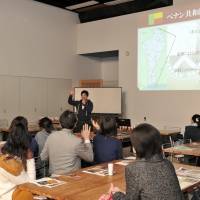The old proverb, "Give a man a fish and you feed him for a day, teach a man to fish and you feed him for a lifetime," has served as the philosophy of various Japanese projects supporting Benin. A seminar to introduce some of these projects was held in Tokyo on March 4.
The seminar was the fifth in a series of educational programs promoting eco-friendly lifestyles. The programs are co-organized by the Minato City Eco-Plaza and The Japan Times, in collaboration with embassies in Tokyo. The sessions look to educate people on various environmental ideas and programs from around the world. In the most recent, the Embassy of the Republic of Benin shared that country's experience of developing its shea butter industry.
"I realized that I knew little about the history of Africa," said Masayuki Yamamichi, special adviser to the ambassador of Benin to Japan, and the main speaker at the event. He spoke of his casual encounter in 2000 with future Ambassador Zomahoun Rufin, a Beninese personality in Japan popularly known as Zomahon. The conversation with Zomahon inspired Yamamichi, who was to become a history teacher, to get involved in an education and school building project in Benin.
Since then, Yamamichi has worked with Zomahon in establishing the non-profit organization IFE (which means "love" in one of Benin's indigenous languages) in Benin and Japan, as well as cooperating on further projects.
The West African nation of Benin is a small country with poor mineral resources. Most of the population is engaged in the agricultural sector. In 2003, the school enrollment rate was just over 68 percent due to poverty.
IFE has built six elementary schools in Benin, as well as a Japanese language school in Cotonou, the largest city and economic center of Benin. So far, 37 Beninese students have studied in Japan thanks to the project.
At the seminar, Yamamichi introduced one such student, Corine Akpla, who is currently studying at Kyoritsu Women's University in Tokyo.
"The next step was to create a stage for these young people," Yamamichi said. "To that end, we created the Feel Peace project."
In collaboration with Japanese cosmetics company Graphico, Inc., the Feel Peace project has been working to develop Benin's shea butter industry.
Shea butter is made from the nuts of shea trees, which only grow naturally in the West African savanna belt that stretches to the foothills of the Ethiopian highlands.
For thousands of years, shea butter's skin care and healing properties have been used to protect hair and skin against the fierce sun and hot dry winds of African deserts and savannahs.
"My mother is a hairdresser and always uses shea butter to make her customers' hair softer," said Akpla.
In a video shown in the seminar, Sumiyo Hasegawa, the founder and CEO of Graphico, talked about how difficult it was to convince her staff and work with African people, but also how the challenge was worth doing, as everyone involved came to feel proud to be part of the project.
Graphico's Skin Peace, a series of shea butter skin care products — made with 100 percent food ingredients from Benin — gradually gained popularity, providing support for Benin through their purchase. As sales have grown, shea butter production in Benin has expanded in tandem.
Profits from Skin Peace were returned to Benin to help build basic infrastructure such as wells to supply water to villages. The company also supported local education and sponsored schooling for 100 children.
In the video, Zomahon, who has served as the ambassador since 2012, praised the spirit of the Japanese company placing the interests of the local people first.
While rethinking the fair trade movement, Yamamichi spoke about the challenges facing Benin due to a social structure that dates back to the colonial period.
"The most important thing is to be prepared to continue working with local people," Yamamichi said. "There are many challenges, but we'll do what we can to continue."
This feature reports on a series of environmental educational programs co-organized by Minato City Eco-Plaza and The Japan Times in collaboration with embassies in Tokyo. For more information, call 03-5404-7764, or visit www.minato-ecoplaza.net.




















With your current subscription plan you can comment on stories. However, before writing your first comment, please create a display name in the Profile section of your subscriber account page.